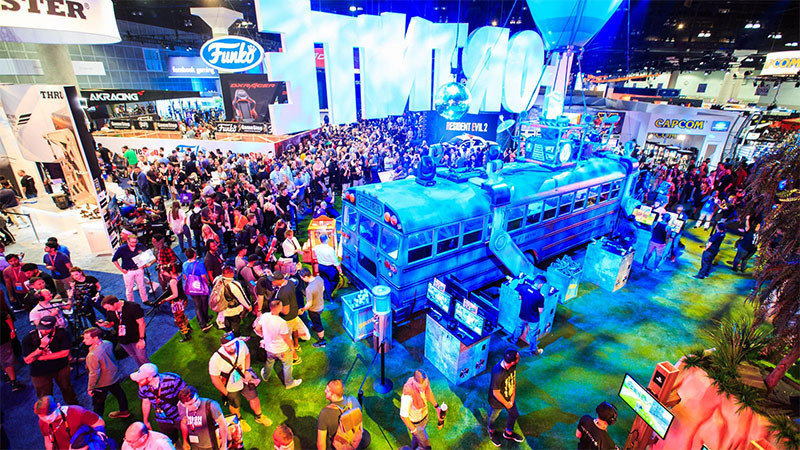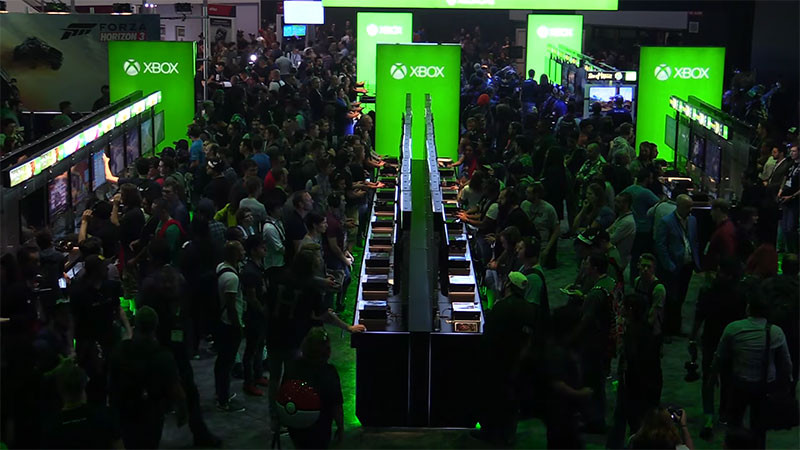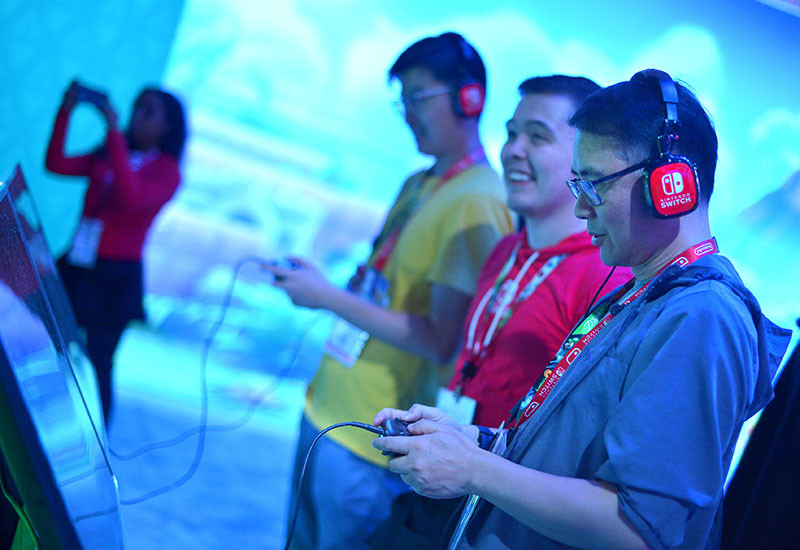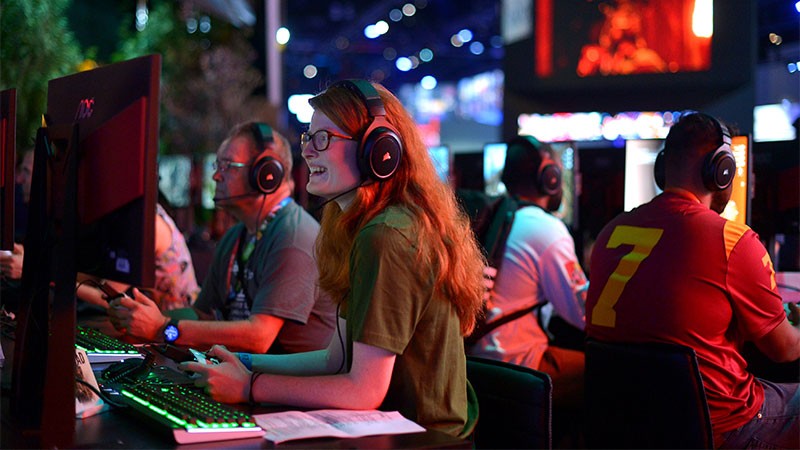
“Do you miss E3 in-person events?” Geoff Keighley reads calmly.
It would not have been, all things considered, an unusual question to ask one of the game industry’s leading personalities. The Entertainment Software Association’s Electronic Entertainment Expo, better known as E3, has long been a dominating feature of the summer. But in the wake of the COVID-19 pandemic, the ESA hasn’t been able to open the doors to the highly regarded in-person convention.
However, Keighley is the driving force behind Summer Game Fest, a newly established but increasingly successful showcase effectively competing with E3. The query came from one of the many viewers who tuned in to see him speak candidly on YouTube following the Xbox/Bethesda showcase, one of Summer Game Fest’s crowning jewels. Keighley’s answer notably dropped any mention of the ESA’s show.
Admittedly, talking about the rival event and the current, contentious shape of the summer showcases is a strange way to begin a look back at the renowned show. But, curiously, the question above underscores just how impactful E3 has been for the game industry. Without the apparent intention to slight Summer Game Fest’s producer, the viewer conflates the idea of a summer gaming convention with E3. The question concisely articulates what the show still means to many: a traditional, inevitable, and unshakable mainstay of the industry’s yearly agenda – even if E3 has undergone cancellations, adjustments, criticisms, and competition in the last few years. Despite its recent stumbles, the expo continues to hold on to its carefully cultivated clout, which goes back decades.

Foundations of Gaming’s Biggest Show
The first E3 took place in 1995. Some might argue the Game Developers Conference (GDC), first held in a California living room back in 1988, can claim a longer history, but GDC didn’t coalesce into the shape we recognize today until 1996, the same year as the first Tokyo Game Show. Other current popular game-centric events, like PAX and Gamescom, didn’t hit the scene until the early 2000s. And according to Kinda Funny co-founder and one-time E3 host Greg Miller, that long legacy is what makes the show gaming’s biggest.
“What makes E3 such an event is its history,” Miller tells Game Informer. “E3’s reputation precedes itself. And it grew by leaps and bounds because the more people would talk about it or report on it, the more people would read that. And then the more people would be inspired [to say], ‘Oh, I want to go to that.’”

It’s hard to argue with him. E3 has been around for 27 years, meaning an entire generation of gamers have never lived in a world where the show didn’t exist. Many up-and-coming game journalists entered the profession hoping to cover the expo. It was the industry’s white whale. And numerous veteran writers still recall the excitement of its rise, realizing their niche hobby was jumping into the wider consciousness.
“I remember getting that first E3 badge and being like, ‘Oh my gosh, I’ve made it,’” Miller recalls. That was 15 years ago when he was still writing for IGN. But despite the many conventions Miller would later attend, he explains the ESA’s show had an element of magic. “E3 was always this event where the excitement was crackling,” he says. And he’s not the only recognizable personality with long-time veneration for the convention.
“22 years ago, I walked into the first E3 as a wide-eyed 15-year-old kid who didn’t quite know his place in the world. E3 Expo brought my hobby out of my computer and into mainstream culture,” writes Geoff Keighley. The expo’s future competitor used this line in 2017 to introduce the world to his new, interview-focused E3 offering, the E3 Coliseum. Its panels brought developers, publishers, industry insiders, and more together to dive deep into some of gaming’s most anticipated projects.
“To be honest,” Keighley continues, “the spectacle of E3 convinced me that I should devote my career to this incredible medium.” The allure of the busy show floor and spotlighted stage wasn’t limited to just video game media; it attracted people from every corner of the industry.

Magic On and Off the Stage
Though now retired, former Nintendo of American president Reggie Fils-Aimé is one of the industry’s most recognizable faces and no stranger to the E3 stage. In a recent interview with Game Informer’s Brian Shea, he reminisced over his introduction to the show with the famous words, “My name is Reggie. I’m about kicking ass, I’m about taking names, and we’re about making games.” It was a moment that not only endeared him to the gaming audience at large but also underscored how unexpected, compelling, and influential the live shows could be. Fils-Aimé became an almost overnight sensation, proving E3’s stage was the place where a personality-laden speaker could make a powerful impression on gamers.
Thanks to new technologies, the overflowingly popular shows were beginning more and more to aim directly at the target fanbase. This shift helped make gaming executives – like Mario creator Shigeru Miyamoto, who came out wielding the Master Sword the same year as Fils-Aimé’s debut – and their products household names.
“The reputation of E3 goes hand in hand with the coming up – and I’m old, of course – but the coming up of the internet. It starts from me reading EGM,” recalls Miller, referencing the Electronic Gaming Monthly print magazine that served as many pre-internet gamers’ source of news. “But then it becomes running out of class and going to IGN, going to GameSpot being like, ‘What has gotten announced? What’s happening?’”
With so many new audience members eager to hear the updates spilling out from its stage, the summer showcase rose to even higher prominence. Miller describes E3 as becoming a “giant runaway huge event” unlike any other trade show.
“You’d see Nintendo and PlayStation and Xbox and Konami and everybody side-by-side out there to talk about what they’re doing and really have this thing of, ‘We’ve all agreed, there’s this unspoken contract that this is where we will go, and we will tell you where the next 12 months of gaming are going to take you,’” Miller says. “That’s what made E3 ‘E3.’ It was this idea of the industry coming together to talk about where they’re going.”
While it’s easy to see how that electrified atmosphere could affect viewers, who went away excited for the newly revealed titles, Fils-Aimé explained to Game Informer how the show’s power began transforming things behind closed doors in the industry’s biggest companies. According to Fils-Aimé, his famous debut lines – and the fans’ viral reaction to them – changed the way Nintendo evaluated all future gaming presentations. After 2004, the home of Mario, Zelda, and more started to comb through fans’ online responses to press conferences carefully. It would then incorporate that information into the corporation’s marketing strategy. But while E3 was large enough to affect various facets of the industry, it was far from impervious to the winds of change.

The King is Dead, Long Live the King
Inevitably, any conversation about E3 will feature the participants questioning each other about the first time they attended. I couldn’t resist asking Miller, but it led down an unexpected path. Without delay, he replies that the first E3 he attended was in 2007, following this up with something slightly startling.
“And it’s notable, of course, because it was the year E3 died.”
For such a lively, energetic show, the phrase ‘E3 is dead’ has been a constant refrain. No matter what had happened during the event – awesome reveals, intriguing news, et cetera – someone would declare its certain demise. However, Miller has a pretty good reason for his assertion.
“My first E3 was the Santa Monica E3, where Gamecock had a funeral procession through the streets of Santa Monica for it. And we bounced around to a million different little locations trying to get to it before they were like, ‘You know? This is actually worse. We will bring back E3 the traditional way the next year.’”
